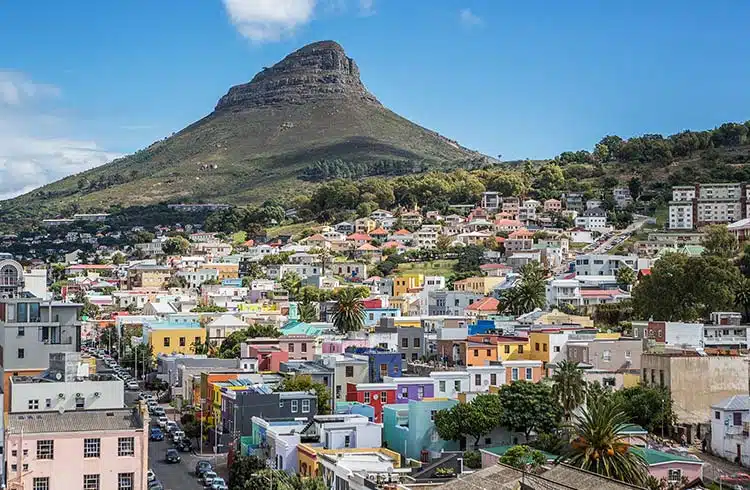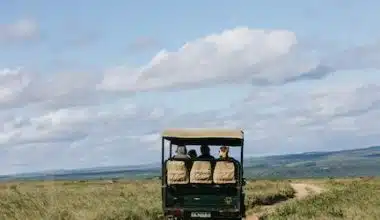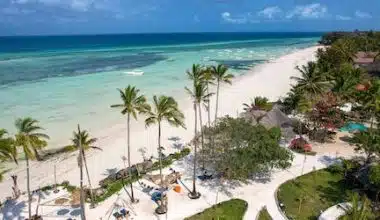When someone travels to South Africa for the first time, they usually realize they have allowed far too little time. Although Big Five safaris and Cape Town are its most well-known features, there is much more to them. The country’s highest altitudes, the Drakensberg Mountains, are crisscrossed with hiking paths. In addition, you may go rock climbing, horseback riding, or just take in the scenery from your accommodation. Read on to learn more about South Africa travel visa requirements and packages.
Set out on a journey of a lifetime with South Africa Travel, where a mosaic of experiences is juxtaposed against energetic towns and unmatched wildlife encounters. With a rich cultural past, South Africa is a stunning, diversified nation. A valid passport, knowledge of local laws and customs, a yellow fever certificate, extra documents for traveling with minors, high security, and safety are all prerequisites for travel. In addition, there are widespread power outages in South Africa, which can cause problems for services and transportation.
South Africa Travel
Situated in the southernmost part of Africa, South Africa is a stunning and diverse country. It provides a diverse array of vacation experiences, ranging from breathtaking natural scenery to energetic cities and an abundance of cultural heritage. That being said, there are a few things to consider while organizing a trip to South Africa.
There are a few things to consider before visiting South Africa. Among them are:
#1. A Valid Passport
A passport that is currently valid for at least six months beyond the intended departure date is required.
#2. Requirements for Visas
Before going to South Africa, you might need to get a visa, depending on your country of origin and the reason for your visit. You do not require a visa if you are a British citizen and your visit is for fewer than ninety days. However, you will need to apply for a temporary resident visa rather than a visitor’s visa if your visit is longer than ninety days or if you intend to study or work in South Africa.
#3. Certificate of Vaccination
A yellow fever certificate is only necessary if you are passing through an area where the epidemic has spread before entering South Africa.
#4. Additional Documentation for Traveling with Children
Extra documentation is needed if you are traveling with kids or if kids are traveling to and from South Africa alone. Refer to the Department of Home Affairs of South Africa’s recommendation for complete details on requirements when traveling with kids.
#5. Security
There is a lot of crime in South Africa, especially violent crimes like carjacking, mugging, and armed robbery. In South Africa, protests, strikes, and demonstrations are common, and they can turn violent at any time without warning. These occurrences may have an impact on traffic, transportation, and other services.
#6. Additional Considerations
In South Africa, load shedding, sometimes known as rolling blackouts or power shortages, occurs statewide. Regular outages are anticipated to persist through 2023 and into 2024. Even if there is little chance of a national blackout, it is nevertheless necessary to be informed of the risks.
#7. Money and Currency
The South African Rand (ZAR) is the currency in use in that country. It’s best to exchange money before you travel or take out ATM cash when you get there. While most large cities and tourist destinations take credit cards, it’s usually a good idea to have cash on hand for smaller businesses and outlying locations.
#8. Environment and Wildlife
The varied wildlife and environmental reserves of South Africa are well known. It’s crucial to abide by the rules set forth by the local government and show respect for the animals if you intend to go on a safari or visit national parks.
#10. Activities and Attractions
Numerous attractions and activities are available in South Africa, such as viewing Table Mountain in Cape Town, traveling through Kruger National Park, tasting wine in the Cape Winelands, and taking in the energetic city life of Johannesburg. Based on your choices and areas of interest, research and create your schedule.
South Africa Travel Visa Requirements
There may be regulations related to obtaining a visa before entering South Africa.
A valid passport for at least 30 days, a yellow fever certificate for travelers from or through yellow fever belt areas, additional requirements for traveling minors, and exemptions for certain nationalities are among the conditions for obtaining a visa to South Africa. Travel packages to South Africa include luxury, cultural, safari, adventure, and family-friendly options. Adventure packages provide experiences for thrill-seekers; safari packages offer wildlife encounters; and cultural and historical packages take you through cities.
Based on the search results, the following is an explanation of South Africa’s visa requirements:
#1. Visa for Visitors
In most cases, you will need to apply for a visitor’s visa if you intend to visit South Africa for 90 days or fewer for tourism or pleasure. You can enter the nation with this visa in order to travel, see loved ones, attend conferences, or attend events. The visitor’s visa cannot be used for employment or education.
#2. Validity of Passport
Your passport must be valid for at least 30 days after the day you want to leave South Africa. Additionally, it must contain at least two consecutive blank visa pages with the word “Visa” on them so that the South African Immigration Services can endorse them and mark their entry and departure.
#3. Certificate of Yellow Fever
If you are entering South Africa after leaving or passing through a region where the yellow fever epidemic is present, you might need to show a yellow fever certificate. The purpose of this rule is to stop yellow fever from spreading.
#4. Minors Traveling
There are certain criteria to be aware of if you are going to or from South Africa with minors (those under the age of 18). To obtain the most recent information regarding traveling with minors, it is recommended that you visit the Department of Home Affairs website.
#5. Exemption Nations
There are certain nationalities that do not need a visa to enter South Africa. For the most recent information, it is advised to confirm with the appropriate authorities or South Africa’s Department of Home Affairs regarding the list of exempt countries and the terms of visa exemption, as these details are subject to change.
#6. Financial Means
You might need to show proof that you have enough money to pay for your daily needs while you’re in South Africa. Bank statements, wage advances, promises made by hosts, bursaries, or health insurance are examples of this.
#7. Regional Travel
You won’t always be granted a second 90-day visitor’s visa if you depart and return to South Africa, even for a brief visit. Make sure your travel plans reflect the possibility of an immigration official denying your admission.
#8. Visitor’s Visa vs. Temporary Residence Visa
In lieu of a visitor’s visa, you must apply for a temporary resident visa if your stay in South Africa is expected to be longer than ninety days or if you intend to study or work there. A visitor’s visa has different restrictions than a temporary residency visa.
#9. Visa Application Process
At South African ports of entry, visas are not granted, and passengers must provide their valid visas before being allowed to board the aircraft. Immigration officials are required to arrange for you to be placed on an aircraft back to your home country if you arrive without a valid visa. You can apply for either a transit visa or a visitor’s visa, depending on the purpose of your visit.
#10. Consulates and Embassies
The U.S. Consulate General in Johannesburg, the U.S. Consulate General in Cape Town, and the U.S. Embassy in Pretoria can all be contacted if you are an American citizen in need of assistance while in South Africa. In addition to consular services, these offices are able to help in an emergency.
South Africa Travel Package
There are numerous travel packages available that accommodate a range of interests and preferences when organizing a vacation to South Africa. These packages frequently combine lodging, transportation, activities, and occasionally meals.
Travel packages to South Africa:
#1. Safari Packages
South Africa is well known for its safari adventures and wildlife. Safari packages provide you the chance to discover amazing animals as well as game reserves and national parks like Kruger National Park. Game drives, lodging in lodges or tented camps, and professional guides are frequently included in these packages.
#2. Adventure Packages
Adventure packages in South Africa offer opportunities for outdoor enthusiasts and thrill-seekers to engage in activities such as hiking, abseiling, bungee jumping, and shark cage diving. These packages are made to provide heart-pounding experiences in the varied topography of the nation, which includes mountains and coasts.
#3. Historical and Cultural Packages
South Africa boasts a lively culture and a long history. Travelers can visit historical locations like Robben Island and the Apartheid Museum, see cities like Cape Town, Johannesburg, and Durban, and interact with local people to discover their customs and traditions by booking cultural and historical packages.
#4. Luxury Packages
South Africa’s luxury holiday packages provide upscale lodging, unique experiences, and individualized attention. These packages frequently consist of private game drives, sophisticated dining experiences, spa treatments, and accommodations in opulent lodges or boutique hotels.
#5. Family-Friendly Packages
A fantastic place to have a family vacation in South Africa, all ages can enjoy the activities and lodging offered by family-friendly packages. Visits to family-friendly destinations, including theme parks, wildlife sanctuaries, and interactive museums, may be included in these packages.
#6. Customized Packages
Numerous tour companies and travel agencies provide personalized packages that may be adjusted to suit unique tastes and passions. With these packages, tourists can select the accommodations, activities, and places that best suit their interests.
#7. Wine and Culinary Packages
South Africa’s gastronomic sector is renowned for its diversity and high-quality wines. Explore the nation’s well-known wine areas, such as Stellenbosch and Franschhoek, and treat yourself to wine tastings, cellar tours, and fine dining experiences with wine and culinary packages.
#8. Beach and Coastal Packages
South Africa is home to breathtaking beaches and gorgeous coastlines. Beach and coastal packages let visitors unwind and take in the water, sand, and sun. These packages frequently consist of visits to coastal cities and sights, accommodations in resorts with beach access, and water sports activities.
#9. Golf Packages
For golf fans, South Africa is a popular destination. Golf packages give visitors access to top-notch golf courses and resorts so they can indulge in their preferred sport while taking in the breathtaking scenery of the nation.
#10. Honeymoon Packages
Due to its romantic scenery and distinctive experiences, South Africa is a favorite destination for honeymooners. Newlyweds can make wonderful memories with candlelit dinners, personalized excursions, cozy lodgings, and the extra touches offered by honeymoon packages.
South Africa Travel Vaccine
It’s crucial to think about getting the recommended vaccinations from South Africa in order to safeguard your health. To find out which specific vaccinations are advised for your trip, speak with a medical professional or travel health specialist. They will consider your medical history, current health, and the most recent recommendations from reliable sources like the World Health Organization (WHO) and the Centers for Disease Control and Prevention (CDC).
Visitors to South Africa should take into account getting regular vaccinations against hepatitis A and B, typhoid, yellow fever, malaria, chickenpox, shingles, and MMR. Because of tainted food and water, hepatitis A and B vaccinations are advised. It is advised against consuming tainted food, traveling to remote locations, or staying longer than necessary. Malaria exists in some areas. yellow fever necessitates a current ICVP, and for individuals who have not received a vaccination, chickenpox is advised.
Consider these important vaccinations:
#1. Routine Vaccines
Make sure you have received all recommended immunizations, such as influenza, polio, varicella (chickenpox), diphtheria-tetanus-pertussis, and measles-Tola (MMR) shots. In order to provide general protection against common diseases, these vaccines are essential.
#2. Hepatitis A and B
Vaccination against hepatitis A and B is advised for visitors to South Africa. infected food and water can spread hepatitis A, whereas infected needles, blood, or sexual contact can spread hepatitis B. Getting vaccinated is especially crucial if you want to visit remote locations, interact closely with locals, or partake in activities that could expose you to these illnesses.
#3. Typhoid
Typhoid fever is a bacterial infection that spreads through contaminated food and water. Travelers who plan to visit smaller towns or rural regions, spend longer than a few days in South Africa, or drink water and food that may be contaminated are advised to get the typhoid vaccination.
#4. Yellow Fever
Travelers aged one year and older who are arriving from or passing through nations where there is a risk of yellow fever transmission must have a valid International Certificate of Immunization or Prophylaxis (ICVP) attesting to their yellow fever immunization. If you have spent the last twelve hours in a country where yellow fever is a concern, you must provide proof of your immunization against the disease.
#5. Malaria
There are areas of South Africa where malaria is prevalent, especially in the northeast. If you are visiting these regions, it is crucial to take preventative measures against mosquito bites and to think about taking antimalarial medication. See a doctor or travel health specialist to find out which antimalarial drug is best for you based on your unique travel schedule and medical background.
#6. Chickenpox
For those who have never received a vaccination or who have had chickenpox in the past, vaccination is advised. Both direct touch and airborne particles can spread it.
#7. Shingles
Those who have already had shingles can receive the shingles vaccine. Physical touch is a means of communication.
#8. Pneumonia
Vaccinations against pneumonia are advised, particularly for people who are immunocompromised or older than 65. For pneumonia, there are two different vaccines available.
#9. Influenza
It is advised to get the influenza vaccination, particularly during flu season. Every year, the vaccine’s ingredients are modified to specifically target the most common forms of the flu virus.
#10. Meningitis
For those who are at a higher risk or who have not received a vaccination, especially students, the meningitis vaccine is advised. Direct contact and airborne contact are the two main ways that meningitis spreads.
Is it safe to travel to South Africa right now?
American travelers should exercise caution in South Asia now because of a number of issues, including high rates of crime and civil upheaval. Power travelers need to take the appropriate safety measures, be informed about official travel advisories, and be aware of any potential risks.
Can I enter South Africa as a Tourist?
Yes, you are permitted to enter South Africa as a tourist for up to 90 days for either business or pleasure without a visa. It is advised to confirm the most recent information from official sources prior to your travel, as admission procedures and rules are subject to change.
What Documents do I need to travel to South Africa?
You will need a valid passport to enter South Africa as a tourist, and depending on your nationality, you might not need a visa for visits lasting up to ninety days. You will require a yellow fever certificate if you are leaving or entering a nation where there is a danger of contracting the disease. It’s critical to keep informed about health alerts. It’s also a good idea to have documentation of your vacation itinerary.
What Do I Need to Know Before Going to South Africa?
Make sure you have the required travel documents, exercise caution, have your health examined, learn a few basic phrases in the local language, pack a universal travel adapter, select safe modes of transportation, become familiar with the local currency, and learn about any health concerns before visiting South Africa. To ensure a safe vacation, keep yourself informed, heed official travel advisories, and take the appropriate safety measures.
Do Nigerians need visas to South Africa?
To enter South Africa, Nigerian nationals require a visa. Nonetheless, Nigerian nationals can now apply online for a short-term eVisa through the South African Department of Home Affairs’ eVisa program, doing away with the need to apply for a consular visa. Depending on the visa of the traveler, the visa can be used for one or several entries.
How Much Is a South African Visa?
The kind of visa and length of stay have an impact on the cost of a South African visa. The South African Department of Home Affairs has published a Schedule of Fees, which states that the majority of visitor visas—including business, student, and tourist visas—cost $36.00. There is a $127.00 price for some visas, though, including the Business Visa for stays longer than 90 days, the General Work Visa, the Intra-Company Transfer Work Visa, and the Critical Skills Work Visa. It is significant to remember that these costs are expressed in US dollars and could vary.
Summary
The ideal time to travel to South Africa is highly dependent on your plans. The ideal months to go on a safari in Kruger National Park are June through September. This is the dry winter season, when there is less bush cover, making it simpler to see wildlife. If you’re considering visiting the Western Cape, consider December through February instead. Due to its Mediterranean climate, this region of the nation experiences dry summers and wet winters. You should also take notice of the national festivals and events, since you may wish to schedule your visit during them.
- TRAVEL TO AFRICA: A Guide to Unforgettable Travel Experiences
- IS IT SAFE TO TRAVEL? All You Need To Know
- BEST TIME TO VISIT SOUTH AFRICA
- SOUTH AFRICA HOLIDAYS: A Land of Breathtaking Landscapes and Diverse Cultures
- TOP SOUTH AFRICAN RESORTS IN 2023






